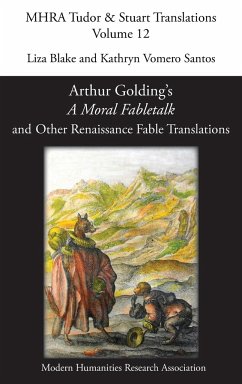
Arthur Golding's 'A Moral Fabletalk' and Other Renaissance Fable Translations
Versandkostenfrei!
Versandfertig in 1-2 Wochen
73,99 €
inkl. MwSt.

PAYBACK Punkte
37 °P sammeln!
This volume brings together five translations of Aesopian fables that range from the beginning to the end of the English Renaissance. At the centre of the volume is an edition of the entirety of Arthur Golding’s manuscript translation of emblematic fables, A Morall Fabletalke (c. 1580s). By situating Golding’s text alongside William Caxton’s early printed translation from French (1485), Richard Smith’s English version of Robert Henryson’s Middle Scots Moral Fabillis (1577), John Brinsley’s grammar school translation (1617), and John Ogilby’s politicized fables translated at the e...
This volume brings together five translations of Aesopian fables that range from the beginning to the end of the English Renaissance. At the centre of the volume is an edition of the entirety of Arthur Golding’s manuscript translation of emblematic fables, A Morall Fabletalke (c. 1580s). By situating Golding’s text alongside William Caxton’s early printed translation from French (1485), Richard Smith’s English version of Robert Henryson’s Middle Scots Moral Fabillis (1577), John Brinsley’s grammar school translation (1617), and John Ogilby’s politicized fables translated at the end of the English Civil War (1651), this book shows the wide-ranging forms and functions of the fable during this period. Because Renaissance fables were not only textual but also visual, the edition includes the original images (woodcuts and engravings) designed to accompany the fables. The variety of fable translation practices included in this volume expands our understanding of literary translation in the early modern period. Likewise, the diversity of what gets counted as a fable, as the introduction shows, has implications both for the history of the Aesopian fable, and for the history of reading and thinking about fiction in the English Renaissance.


